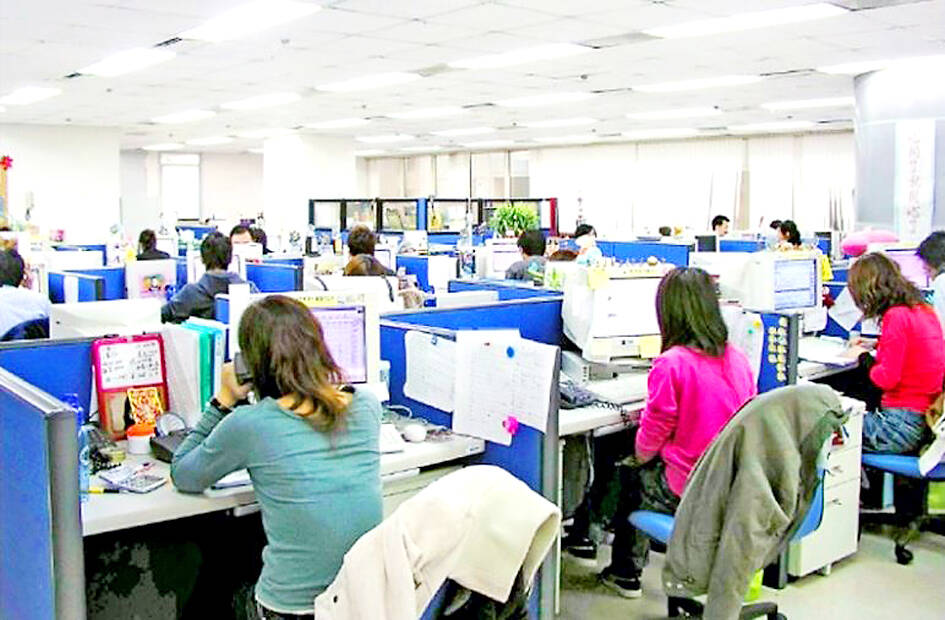The government is obligated to respond by the end of next month to a proposal that would make Taiwan the first Asian country to allow workers three days off per week, after the suggestion was endorsed by more than 5,700 people on the Public Policy Online Participation Network Platform.
Although Taiwan’s average work hours per year dropped to 2,000 hours in 2021, it still ranked the fourth-highest in the world, said a person identified only as Lukas, who proposed the policy change on the platform.
An experiment on a four-day work week in the UK, with 69 companies and more than 2,900 employees participating, showed that corporations’ revenue jumped an average of 35 percent during the trial period compared with a year earlier, while average worker turnover dropped to 57 percent, the proposal says.

Photo: Taipei Times
Moreover, 92 percent of the companies in the six-month trial opted to continue the practice after the experiment ended, it says.
As of April 26, the local proposal had been endorsed by 5,736 people, surpassing the required 5,000, and obligating the government to give a response by June 26, based on the rules of the platform.
Another proposal on the platform, by a person called Yenfei (煙緋), proposed amending Article 30 of the Labor Standards Act (勞動基準法) to limit work to six to seven hours per day and 30 to 35 hours per week. Overtime hours can also be included in the weekly work hours.
As of May 2, the proposal had been endorsed by 5,140 people, and the government has to respond by July 2.
“Most workers in Taiwan spend more than 12 hours at work, including time commuting to and from work, and overtime. Taiwanese workers are overworked compared with their peers in advanced countries,” the proposal says.
Shortening work hours would increase rest time for workers and reduce occupational hazards, traffic accidents and the spread of diseases, it says.
With reduced work hours, more young people would be willing to start a family, it says.
Huang Wei-chen (黃維琛), director of the Ministry of Labor’s Department of Labor Standards and Equal Employment, said the ministry would have to discuss the issue first with the people who made the proposals to avoid any misunderstanding.
“We will assess how the policy change would affect different government agencies and provide an official response before the deadline,” Huang said.
A three days off a week policy would affect not only workers, but also teachers, civil servants, military personnel and students, Huang said.
“We need to consult the Ministry of Education about its opinion as well,” he said. “Shortening work hours would involve an amendment of the Labor Standards Act, and we need to consult business and labor groups and other government agencies.”
Vice Premier Cheng Wen-tsan (鄭文燦) said that no Asian country has adopted a four-day work week, but the government would respond to the person who made the proposal and brief them about work hour trends.

The CIA has a message for Chinese government officials worried about their place in Chinese President Xi Jinping’s (習近平) government: Come work with us. The agency released two Mandarin-language videos on social media on Thursday inviting disgruntled officials to contact the CIA. The recruitment videos posted on YouTube and X racked up more than 5 million views combined in their first day. The outreach comes as CIA Director John Ratcliffe has vowed to boost the agency’s use of intelligence from human sources and its focus on China, which has recently targeted US officials with its own espionage operations. The videos are “aimed at

STEADFAST FRIEND: The bills encourage increased Taiwan-US engagement and address China’s distortion of UN Resolution 2758 to isolate Taiwan internationally The Presidential Office yesterday thanked the US House of Representatives for unanimously passing two Taiwan-related bills highlighting its solid support for Taiwan’s democracy and global participation, and for deepening bilateral relations. One of the bills, the Taiwan Assurance Implementation Act, requires the US Department of State to periodically review its guidelines for engagement with Taiwan, and report to the US Congress on the guidelines and plans to lift self-imposed limitations on US-Taiwan engagement. The other bill is the Taiwan International Solidarity Act, which clarifies that UN Resolution 2758 does not address the issue of the representation of Taiwan or its people in

US Indo-Pacific Commander Admiral Samuel Paparo on Friday expressed concern over the rate at which China is diversifying its military exercises, the Financial Times (FT) reported on Saturday. “The rates of change on the depth and breadth of their exercises is the one non-linear effect that I’ve seen in the last year that wakes me up at night or keeps me up at night,” Paparo was quoted by FT as saying while attending the annual Sedona Forum at the McCain Institute in Arizona. Paparo also expressed concern over the speed with which China was expanding its military. While the US

SHIFT: Taiwan’s better-than-expected first-quarter GDP and signs of weakness in the US have driven global capital back to emerging markets, the central bank head said The central bank yesterday blamed market speculation for the steep rise in the local currency, and urged exporters and financial institutions to stay calm and stop panic sell-offs to avoid hurting their own profitability. The nation’s top monetary policymaker said that it would step in, if necessary, to maintain order and stability in the foreign exchange market. The remarks came as the NT dollar yesterday closed up NT$0.919 to NT$30.145 against the US dollar in Taipei trading, after rising as high as NT$29.59 in intraday trading. The local currency has surged 5.85 percent against the greenback over the past two sessions, central